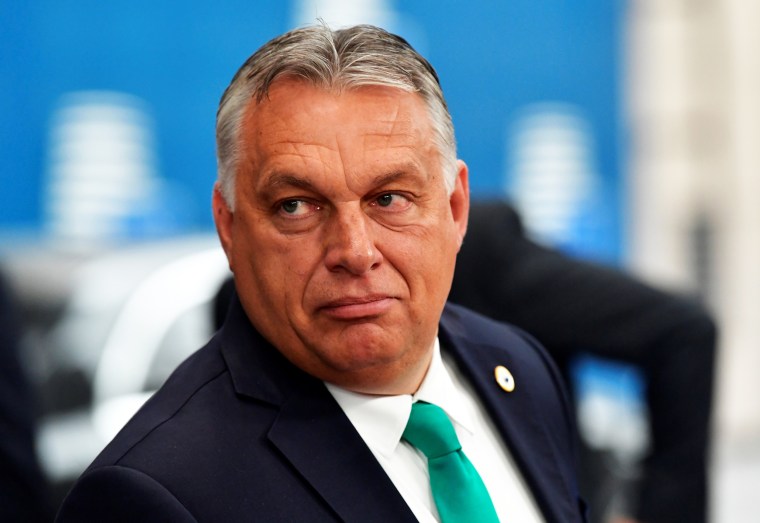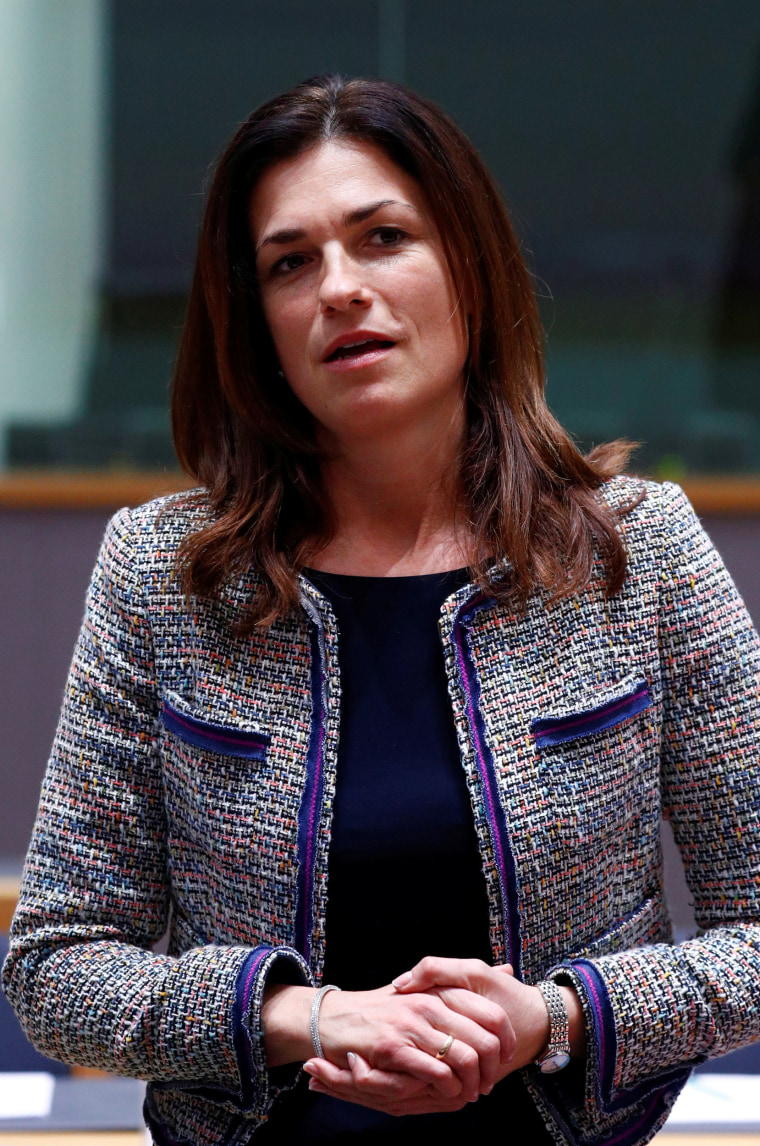Hungary Ramps Up Anti-LGBTQ Legislation
A constitutional amendment before the Hungarian Parliament would effectively ban LGBTQ people from adopting, drawing the ire of human rights activists.
Draft language submitted to parliament this month by Justice Minister Judit Varga states that children must be raised “in accordance with the values based on our homeland’s constitutional identity and Christian culture.”
“The basis for family relations is marriage,” it reads in part. “The mother is a woman, the father is a man.”
Under the amendment, only opposite-sex married couples would be eligible to adopt children, with exceptions made on a case-by-case basis by Minister of Family Affairs Katalin Novák. The bill effectively bans gay couples, single people and unmarried straight couples from adopting.
It also asserts that the government “protects children’s right to the gender identity they were born with.”

LGBTQ advocates view the proposals, which are expected to pass next month, as yet another assault by Prime Minister Viktor Orbán’s right-wing party, Fidesz, which has been in power since 2010 and maintains a two-thirds majority in Parliament.
A new constitution enacted in 2012 defines marriage exclusively as the union of a man and a woman and asserts that the traditional family is “the basis of the survival of the nation.”
Gay people “can do what they want, but they cannot get their marriages recognized by the state,” Orbán said in 2016 interview. “An apple cannot ask to be called a pear.”
In 2019, the speaker of the Hungarian National Assembly, László Kövér, compared same-sex couples wanting to adopt or marry to pedophiles. “Morally, there is no difference,” said Kövér, a founding member of Fidesz and a close ally of Orbán.
Senior party officials even called for a boycott of Coca-Cola when it launched an LGBTQ-inclusive ad campaign that summer. In May, the government reversed regulations allowing transgender and intersex citizens to change the gender listed on legal documents. The new regulations redefined the word “nem” — which in Hungarian can mean either “sex” or “gender” — to refer specifically to a person’s biological sex at birth “based on primary sex characteristics and chromosomes.”
The law puts trans and intersex people “at risk of harassment, discrimination, and even violence in daily situations when they need to use identity documents,” according to Human Rights Watch.
Another new proposal would abolish the Equal Treatment Authority, an autonomous agency tasked with investigating discrimination based on sexual orientation, ethnicity, religion and other factors.
Some responsibilities would be taken over by the commissioner for fundamental rights, Ákos Kozma, an Orbán loyalist who’s been largely silent on LGBTQ issues. ILGA-Europe, a leading European rights group, said the sole purpose of transferring control to Kozma is to “reduce the efficacy” of anti-discrimination policies.
Related
Trans Americans hopeful Biden admin will stem high levels of violence
These measures come as Hungary, like the rest of the world, is battling a deadly pandemic. Tamás Dombos, a board member for the Hatter Society, Hungary’s oldest and largest gay rights group, said the timing is strategic.
“Now the debate focuses on this issue rather than how bad the government is handling the pandemic or the changes they want to make to the electoral process,” Dombos told NBC News. “They create this noise so the opposition can’t focus on one issue.”
The ban on legal recognition of transgender people was passed just as the pandemic’s first wave hit Hungary. To date, the country of 9.8 million has reported 157,000 cases of Covid-19 and 3,380 deaths.
“The government has used the Covid-19 pandemic as a pretext to grab unlimited power and is using Parliament to rubber-stamp problematic nonpublic-health-related bills,” Human Rights Watch said in a statement Thursday.
The new amendments were presented on Nov. 10, the same day Parliament voted to extend a coronavirus-related state of emergency that Orbán had declared a week earlier.
Not only do they further stigmatize transgender people and same-sex couples raising children, Dombos said, they also make outreach to LGBTQ youth nearly impossible.
But the attacks on the LGBTQ community aren’t limited to the corridors of the Hungarian Parliament. “A Fairy Tale for Everyone,” a Hungarian children’s book with well-known tales incorporating gay people and other marginalized groups, was met with a barrage of homophobic vitriol when it was published in September. A leading Fidesz politician tore apart a copy page by page at a news conference, and a petition demanding it be removed from stores garnered more than 85,000 signatures.
Talking about the book on a Budapest radio show, Orbán said the LGBTQ community should “leave our children alone.”
“Hungarians are patient and tolerant” of homosexuality, he said. “We also tolerate provocation well, but there is a red line that cannot be crossed.”
The book’s authors, Dorottya Redai and Boldizsár Nagy, said they were disturbed by Orbán’s rhetoric. “When a prime minister says something like this … others will think they can also,” they told Time magazine.
Dombos said while he hasn’t seen physical violence, people on the street are getting more vocal. “Now you get called names. They shout, ‘Hey f—-t!’ That never happened before,” he said. “They feel encouraged now.”
Last month, Redai told Time that a large poster declaring, “Homosexual propaganda publication, which is dangerous for children, is sold here,” was draped outside a bookstore selling “A Fairy Tale for Everyone.”
Related
EU launches LGBTQ protection strategy as homophobia rises in east
Even a cosmopolitan city like Budapest, one of the first in Eastern Europe to hold a Pride march, hasn’t been immune. In August, a rainbow flag displayed outside City Hall was ripped down and thrown in the garbage.
Recommended
OUT POLITICS AND POLICYMeet Oklahoma’s Mauree Turner, America’s first nonbinary state legislator
OUT POLITICS AND POLICYTrans Americans hopeful Biden admin will stem high levels of violence
Előd Novák, party leader of the extremist group Mi Hazánk, took credit for the vandalism, declaring that the “anti-family symbol has no place on the street.”
Budapest Mayor Gergely Karácsony had been the first to fly the symbol of the LGBTQ community on city property.
Days earlier, nationalist football fans calling themselves Aryan Greens reportedly set fire to a Pride flag outside another municipal building and replaced it with a banner for their favorite team.
The increasing homophobia has had a chilling effect on Hungary’s LGBTQ community.
“The general strategy for people is to stay in the closet,” Dombos said. “More than half aren’t out to their family, and only about 20 percent are out at work.” It has also pushed some to leave the country.
“The reasons why people emigrate are complex, but many LGBTQ people say dealing with discrimination and homophobic language day after day was an important factor,” Dombos said. “It’s quite easy to leave within the E.U. — you can go to Germany or other European countries where the jobs are better and there’s more acceptance.”
For those who stay and fight, countering a party with two-thirds majority is difficult under normal circumstances. During the pandemic, activists can’t have demonstrations, meet with politicians or even even hold in-person gatherings.
“We try to gather online, but it’s just not the same,” Dombos said.
Just days after Hungary announced the latest proposed amendments, the European Union’s executive commission announced its first formal strategy to protect the rights of LGBTQ citizens.
“We will defend the rights of LGBT people against those who have more and more appetite to attack them from an ideological point of view,” E.U. Commission Vice President Vera Jourova said Nov. 13 at a news conference. “This belongs to the authoritarian playbook, and it does not have a place in the E.U.”
The strategy proposes adding anti-gay hate crimes to the list of offenses for which the E.U. could set minimum penalties, including terrorism, drug trafficking and money laundering. It would also protect the legal status of same-sex married couples in all member states and tie funding to compliance with E.U. anti-discrimination laws.

Varga, the justice minister, condemned the strategy on Twitter, saying Hungary would “not accept any financial threats for protecting the traditional role of family and marriage.”
In any event, the guidelines aren’t binding on member countries. When dozens of Polish cities declared themselves “LGBT-free zones,”the commission could only deny small amounts of funding to a half-dozen towns.
Orbán has forged ideological ties with Poland in rejecting what he sees as an E.U. agenda. At a World War I memorial ceremony in August, Orbán called on central Europe to unite around its Christian roots.
“Western Europe has given up on a Christian Europe,” he warned, “and instead experiments with a godless cosmos, rainbow families, migration and open societies.”
So far, Hungary’s response to European Union pressure over human rights has been to veto E.U. legislation. Last week, Hungary and Poland united to veto the E.U.’s trillion-euro budget and coronavirus recovery package, because access is linked to countries’ adherence to the rule of law and European values.
Orbán previously vetoed ratification of an E.U. treaty on violence against women and an agreement to prevent discrimination against LGBTQ people.
The prime minister, according to Dombos, enjoys the political theatrics and “likes the idea that he’s shaping the E.U.”
Fidesz actually began as a progressive, youth-oriented party in the late 1980s, Dombos added, but then the political landscape changed and the party filled the vacuum in the right-wing space.
“More and more they became extreme, with statements not just about LGBT people, but about homeless people, Roma, Jews, migrants and asylum-seekers,” Dombos said. “Their strategy is to come up with an enemy, create a campaign around it and pass a law, and then tell us how they’ve rescued us from disaster.”